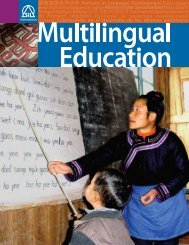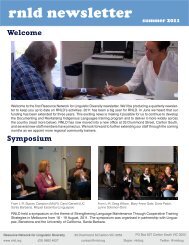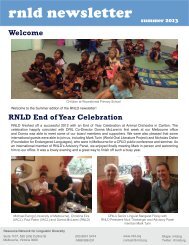The ethnography of language and language ... - Linguistics
The ethnography of language and language ... - Linguistics
The ethnography of language and language ... - Linguistics
You also want an ePaper? Increase the reach of your titles
YUMPU automatically turns print PDFs into web optimized ePapers that Google loves.
120 Jane H. Hill<br />
would then recite the oration: once. <strong>The</strong> job <strong>of</strong> the apprentice was to listen<br />
with the most intense focus, to try to master as much <strong>of</strong> the oration as possible<br />
from this single recitation. Because if he needed to hear it again, another<br />
expensive gift would be required. This particular method really would<br />
not work for most documentary linguistics – in fact, it has been tried. <strong>The</strong><br />
linguist Bill Graves described in his dissertation (Graves 1988) encountering<br />
a Pima speaker, an immensely knowledgeable elder who had been very<br />
highly recommended by everyone, who chose to organize his role as linguistic<br />
consultant along the lines <strong>of</strong> the traditional model for learning that<br />
Underhill had described. Graves had to arrive early, because if he was even<br />
five minutes late for an appointment Mr. Brown would refuse to talk to<br />
him. Graves had to listen with the most extreme care, because Mr. Brown<br />
spoke very quietly, did not like repeating things, <strong>and</strong> refused to explain<br />
things. Mr. Brown would occasionally rise abruptly <strong>and</strong> terminate a meeting<br />
if he was annoyed. Finally, Mr. Brown required cash up front at every<br />
meeting. After a summer <strong>of</strong> this sort <strong>of</strong> thing, Graves reluctantly concluded<br />
that Mr. Brown was a bit too traditional <strong>and</strong> sought a consultant who was<br />
willing to compromise.<br />
<strong>The</strong> absence <strong>of</strong> established routines for adult second-<strong>language</strong> learning<br />
<strong>and</strong> linguistic elicitation in most minority-<strong>language</strong> communities makes it<br />
obvious that elicitation will produce some kind <strong>of</strong> new system that emerges<br />
in collaboration. New theory in “learning how to learn” shows that such<br />
emergent systems are always produced in learning communities, even in<br />
ones that seem well-established <strong>and</strong> stable. Learning communities belong<br />
to the category <strong>of</strong> social organizations that have come to be called “communities<br />
<strong>of</strong> practice.” Eckert <strong>and</strong> McConnell-Ginet (1992: 464) provided a<br />
founding definition <strong>of</strong> this entity: “A community <strong>of</strong> practice is an aggregate<br />
<strong>of</strong> people who come together around mutual engagement in an endeavor …<br />
practices emerge in the course <strong>of</strong> this mutual endeavor.” Meyerh<strong>of</strong>f (2002)<br />
has usefully summarized the theory <strong>of</strong> communities <strong>of</strong> practice, which have<br />
become an important unit <strong>of</strong> analysis in recent variationist sociolinguistics.<br />
<strong>The</strong> key elements <strong>of</strong> Eckert <strong>and</strong> McConnell-Ginet’s definition are mutual<br />
engagement – which may be “harmonious or conflictual,” <strong>and</strong> the endeavor,<br />
which Meyerh<strong>of</strong>f defines as a jointly negotiated enterprise, which<br />
must be reasonably specific. Finally, a community <strong>of</strong> practice will develop<br />
a shared repertoire <strong>of</strong> normative practices <strong>and</strong> interactional resources that<br />
are “the cumulative result <strong>of</strong> internal negotiations” (Meyerh<strong>of</strong>f 2002: 528).<br />
<strong>The</strong>se subcomponents are in dialectical relationship: mutual engagement<br />
both makes possible, <strong>and</strong> is made possible by, the negotiation <strong>of</strong> a joint





